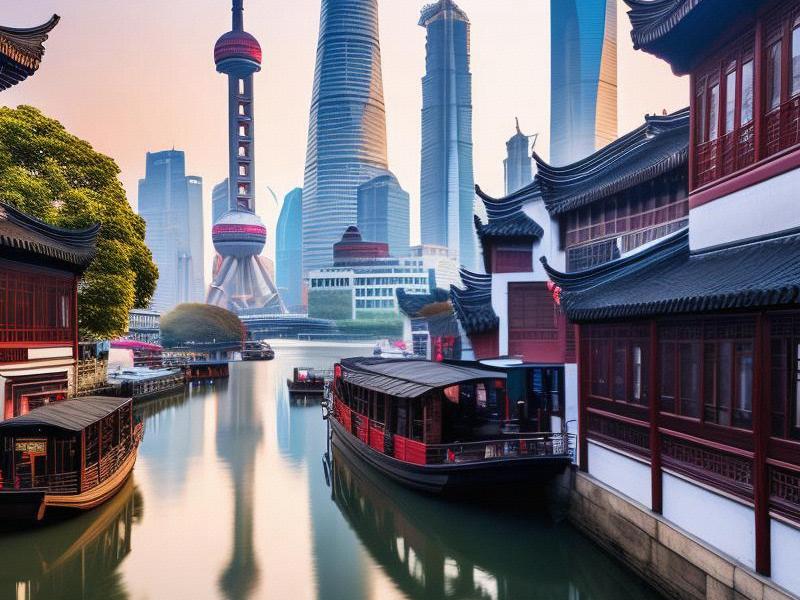
Shanghai, often referred to as the "Pearl of the Orient," stands as a beacon of modernity and tradition in China. Located on the eastern coast of China, at the mouth of the Yangtze River, Shanghai is not only the largest city in the country but also one of the most influential global financial hubs. Its strategic location has made it a melting pot of cultures, a powerhouse of the economy, and a must-visit destination for travelers from around the world.
The city's geography is as fascinating as its history. Shanghai is situated on a low-lying plain, with the Huangpu River bisecting it into two main districts: Puxi (west of the river) and Pudong (east of the river). Puxi is home to the city's historic core, including landmarks like The Bund, a waterfront promenade lined with colonial-era buildings that offer stunning views of the futuristic skyline of Pudong across the river. Pudong, on the other hand, is the site of the iconic Oriental Pearl Tower, the Jin Mao Tower, and the Shanghai Tower, which, at 632 meters, is the tallest building in China and the second-tallest in the world.
Surrounding Shanghai are several other cities and regions that contribute to the broader metropolitan area's vibrancy. These include Suzhou and Hangzhou to the west, known for their classical gardens and serene lakes, and Ningbo and Wenzhou to the east, which are hubs of manufacturing and trade. The Yangtze River Delta, in which Shanghai is located, is one of the most economically developed regions in China, with a combined GDP that rivals that of many countries.
上海龙凤千花1314 Culturally, Shanghai is a city of contrasts. It boasts a rich history that dates back over two thousand years, yet it is also a place where ancient traditions coexist with cutting-edge modernity. The city's colonial past is evident in areas like the French Concession, where cobblestone streets, art deco architecture, and charming cafes transport visitors to another era. At the same time, Shanghai's contemporary culture is reflected in its vibrant art scene, world-class museums, and bustling nightlife.
The economy of Shanghai is a testament to its status as a global financial center. It is home to the Shanghai Stock Exchange, one of the largest in the world, and the city's port is the busiest container port globally. Shanghai's economic success is driven by a dynamic mix of industries, including finance, manufacturing, technology, and trade. The city's free-trade zone has attracted numerous multinational corporations, making it a key player in international commerce.
Tourism is another area where Shanghai shines. Visitors can explore the historic Old Town, with its narrow streets and traditional Shikumen (stone gate) houses, or take a boat ride on the Huangpu River to admire the city's skyline. The Yu Garden, a classical Chinese garden built in the Ming Dynasty, offers a tranquil escape from the urban hustle and bustle. For those interested in modern attractions, the Shanghai Disneyland Resort is a must-visit, featuring world-class rides, entertainment, and themed hotels.
上海喝茶群vx The surrounding areas of Shanghai also offer a wealth of attractions. Suzhou, often called the "Venice of the East," is renowned for its classical gardens, which are UNESCO World Heritage Sites. The gardens, such as the Humble Administrator's Garden and the Master of the Nets Garden, are masterpieces of Chinese landscape design, featuring pavilions, ponds, and rockeries that crteeaa sense of harmony between nature and architecture. Hangzhou, known for its beautiful West Lake, is another cultural gem. The lake, surrounded by lush hills and dotted with temples and pagodas, has inspired poets and artists for centuries.
Ningbo, to the east of Shanghai, is a city with a rich maritime history. It is home to the ancient Tiantong Temple, one of the most important Buddhist temples in China, and the Xuedou Mountain, which offers breathtaking views of the surrounding countryside. Wenzhou, known as the "温州(Wenzhou)" (the温州(Wenzhou)" meaning "Mountain City"), is famous for its entrepreneurial spirit and vibrant economy. Visitors can explore the city's markets, taste its delicious seafood, and learn about its unique culture.
上海品茶工作室 The integration of Shanghai with its surrounding areas is a testament to the region's economic and cultural cohesion. The development of the Yangtze River Delta has created a network of cities that are interconnected in terms of trade, transportation, and tourism. High-speed rail links, such as the Shanghai-Nanjing and Shanghai-Hangzhou lines, make it easy for residents and visitors to travel between cities, fostering a sense of regional unity.
In conclusion, Shanghai and its surroundings offer a rich tapestry of experiences that cater to a wide range of interests. Whether you are interested in history, culture, nature, or modernity, this region has something to offer. The city's strategic location, dynamic economy, and vibrant culture make it a key player on the global stage, while its surrounding areas provide a glimpse into the diverse and beautiful landscapes of China. As you explore Shanghai and its surroundings, you will discover a city and a region that are truly one of a kind.
